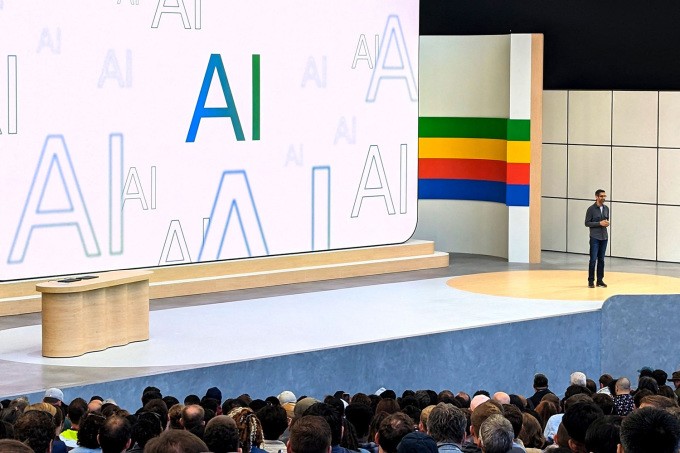AI - the end of the era of Google keyword typing
Modern tech users know what it means to 'Google' something. They type a few keywords into a search box and get a list of blue links to the most relevant results, perhaps with a quick explanation at the top, a map, or a video. Basically, it's just a process of gathering information that's already available on the Internet and presenting it in a neat way.
But society is at a turning point. Right now, the biggest change in the way search engines deliver information to people since the 1990s is happening. Users no longer need to type in keywords or look at links to click.
Instead, we're entering the era of conversational search. This means that instead of keywords, users will type in real questions, expressed in natural language. And instead of a list of links, users will receive answers generated by artificial intelligence (AI) based on information directly from all over the internet.
History of the development of search engines
Archie was the first real Internet search engine. It sifted through files previously hidden on remote servers. Archie revealed the names of these files, but not their contents, the images inside, and there was no hierarchy of results.
Then Tim Berners-Lee created the World Wide Web, and all kinds of websites popped up. The number of websites grew so large that users became confused and needed a better way to find what they were looking for. So in 1994, Jerry Yang created Yahoo - a catalog of websites that quickly became the home page for millions of people.
But the web continued to grow and expand, bringing more information online every day. Instead of a list of websites organized by category, users needed a tool that could actually look at the content and statistics. In the late 1990s, many search engines emerged to do just that, such as AltaVista, AlltheWeb, WebCrawler, and HotBot.
With the rise of search engines came the first attempts to exploit their traffic-providing abilities. Website publishers relied on the valuable traffic to sell advertising, while retailers used the traffic to draw attention to their merchandise. Sometimes they stuffed in keywords or meaningless text just to push their websites higher in search results, frustrating users.
When it launched in 1998, Google revolutionized the way it worked. Instead of just scanning content, it also looked at the sources linking to a website, helping to assess its relevance and relevance. This breakthrough helped Google outperform any previous engine in retrieving relevant results.
For 25 years, Google has dominated Internet search. For most people, Google is the definition of 'search.'

Google CEO Sundar Pichai speaks at a conference in May 2024 in Mountain View, California, USA. Photo: Glenn Chapman
AI is changing the way people search the internet
Google has evolved over time. It has long offered more than just a series of blue links, but also images, videos, snippets, sports scores, and more.
But now, AI is bringing about a big change, and Google is trying to be at the forefront of applying AI to Internet search. In May 2023, the company tested AI answers to search queries. They use their large language model (LLM) to provide answers that users might expect from an expert source or a trusted friend.
Google calls these answers AI Overviews. Google CEO Sundar Pichai calls it one of the most positive changes they've made to search in a long time.
AI Overviews fundamentally change the types of queries Google can handle. Users can now ask questions like: 'I'm going to be in Japan for a week next month. I'm based in Tokyo but want to do some day trips. Are there any festivals happening nearby? What's the surfing like in Kamakura? Are there any quality bands playing?'
And they get a response, not a link, but a full answer. The answer doesn't feel like querying a database, but like asking a smart, knowledgeable friend.
Users can search for things that were previously impossible, and get the right answer. They don't have to be exact about what they're looking for. For example, users can describe a bird in the yard, a problem with their refrigerator, or a strange noise their car is making, and get a consolidated explanation from previously isolated sources on the Internet. Once they try to search that way, they can become 'addicted.'
It's not just Google, OpenAI's ChatGPT now has access to the web, allowing it to find more up-to-date answers to users' questions. Microsoft is launching AI search results for Bing in September 2024. Meta has its own version. Startup Perplexity is doing the same with the motto 'move fast, break things.' Companies are betting trillions of dollars in the race to become the next dominant source of information — the next Google.

In the future, AI can learn and book flight tickets for users. Photo: Dealswithai
The Future of AI Development
Not everyone is excited about the changes AI is bringing. Website publishers are worried about losing traffic from clicks on Google referrals. Content that used to cost money to access can now appear in AI's public answers.
Users also worry about the authenticity of the answers AI provides. Large language models (LLMs) can be confusing, make up stories, or imagine nonsense. Generative AI can provide completely new answers to the same question each time, or provide different answers for each person based on what they know about that person.
Another risk is that users may ask strange, sometimes illegal questions, such as how to make a bomb. Therefore, AI must be extremely careful to avoid giving answers that could be harmful.
Developers are still working to fix these issues, including increasing the authenticity of AI answers. As for accessibility, Pichai said there's no need to worry too much because even in the age of AI Overviews, many people will still want to click on the link to learn more. According to Liz Reid, an expert at Google, AI Overviews allows people to ask more complex questions and go deeper into what they want. As a result, the tool is even useful for some publishers and small businesses, helping them reach new customers.
The way search engines provide answers is also changing rapidly. For example, Google today not only helps search for text, images, and videos, but can even create them. Users can ask: "Show me what a Townsend's warbler looks like in the tree above me."
The capabilities of AI are expanding. Last summer, Google showed off a new tool called Project Astra, which lets cameras, microphones in phones, and smart glasses understand the context around a user, and can recall and respond in a variety of ways. For example, Astra can look at a rough drawing of an F1 race car, identify it, and explain its parts and how to use it.
In the future, with the ability to pull data from the Internet in real time, AI will be able to do much more for humans. When a user is about to take a trip that will last several days, it will collect existing data and book flights, hotel rooms, and dinner reservations based on its knowledge of the user and the upcoming trip, without the user having to guide them. AI can also monitor a family's wastewater for pathogens, order tests and treatments, and even schedule repairs based on strange noises made by cars.